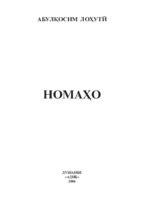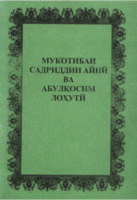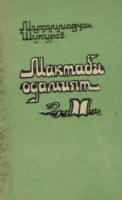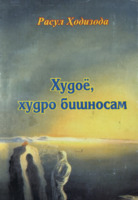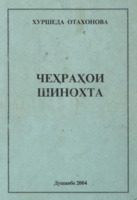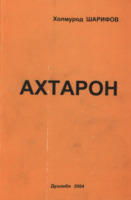Browse Documents (6 total)
Номaҳо Letters
From the publisher: Ин китоб номаҳои то имрўз ба даст омадаи Абулќосим Лохутиро ба адибони тоҷик, ҳамдиёрон, дўстон, аҳли хонавода, хонандагон ва мухлисони ашъори ў дар бар кардааст. Номаҳо бо самимият, ҳарорати дил ва эҳтиром навишта шудаанд.
Abdulqosim Lahuti (1887-1957) was an Iranian/ Tajik writer. Forced to emigrate to the USSR for political reasons, he became a leading figure of Tajik letters and his works were translated into Russian and many other languages. This collection, assembled and annotated by Khursheda Otahonova, consists of letters written by Lahuti to writers in the USSR and abroad, including Sadriddin Ayni, Mirzo Tursunzoda, A. Dekhoti, and Romain Rolland.
Мукотибаи Садриддин Айнӣ ва Абулқосим Лоҳутй. The correspondence of Sadriddin Ayni and Abdulqosem Lahuti
From the publisher: Ин китоб аз мактубҳои ду устоди бузург, Қаҳрамони Тоҷикистон Садриддин Айнӣ ва Абулқосим Лоҳутӣ фароҳам омадааст. Мактубҳо қимати илмиву адабӣ ва таърихӣ доранд.
This is a collection of correspondence between two of Soviet Tajikistan’s most prominent writers: Sadriddin Ayni (1878–1954) and Abdulqosim Lahuti (1887-1957). While both became part of the Tajik literary pantheon, neither had their primary residence in the republic. Ayni spent most of his life in Samarqand, while Lahuti lived in Moscow with his wife, Cecilia Bonu. These letters, held at the Archive of the Rudaki Institute of Literature in Dushanbe, were first published during the Soviet era. This second, more complete edition, includes additional letters from the period of the terror, when Ayni in particular was put under a great deal of pressure. The publication was prepared and edited by Khursheda Otahonova.
This is a collection of correspondence between two of Soviet Tajikistan’s most prominent writers: Sadriddin Ayni (1878–1954) and Abdulqosim Lahuti (1887-1957). While both became part of the Tajik literary pantheon, neither had their primary residence in the republic. Ayni spent most of his life in Samarqand, while Lahuti lived in Moscow with his wife, Cecilia Bonu. These letters, held at the Archive of the Rudaki Institute of Literature in Dushanbe, were first published during the Soviet era. This second, more complete edition, includes additional letters from the period of the terror, when Ayni in particular was put under a great deal of pressure. The publication was prepared and edited by Khursheda Otahonova.
Мактаби одамият: Баъзе масъалаҳои адабиёт
ва маънавият.
The School of humaneness: some questions of literature and spirituality
Muhammadjon Shakuri (Shakurov) (1924-2012) was a Tajik philologist and academician. He studied at the pedagogical institute in Dushanbe and later earned his kandidatskaia and doktorskaia degrees at the Institute of World Literature in Moscow. His professional home, however, remained the Rudaki Institute of Language and Literature in Dushanbe. In the late 1980s he became a leading figure in the campaign for the primacy of the Tajik language. This volume collects a number of his articles on the relationship between literature, spirituality, and morality. It also includes several pieces recounting experiences with Sadriddin Ayni, Mirzo Tursonzoda, A. Dehoti, and Mirsaid Mirshakar.
Худое, худро бишиносам To know oneself and to know God
From the publisher: Олим ва нависандаи маъруф Расул Ҳодизода дар китоби хотироташ ҳамзамон бо тасвири марҳилаҳои зиндаги ва фаъолияти худ дар бораи воқеахри таърихии илму маданият ва симохри шинохтаи адабиёт, илм ва фарх,анги тоҷик хркоятхри ҷолиб аз диду дили худ нақл намудааст. Чунонки муаллиф гуфтааст, ин китоб "еде аз саҳифаҳои таърихи замой ва одамон аст", ки 6а хонандаи имруз тақдим мешавад.
Rasul Hodizoda (1928-2010) was a writer, translator, and scholar. Born in Samarkand, he studied in Tashkent, worked briefly in radio, and later did graduate work in Moscow. Hodizoda spent most of his career at the Rudaki Institute in Dushanbe, but was also active in the Union of Writers and published in all-union publications such as Druzhba Narodov. These particularly detailed memoirs cover his childhood, education, and career. Hodizoda also provides detail on his experiences writing a novel about Ahmad Donish and his relationship with mentors like Sadriddin Ayni, Mikhail Andreev, and Aleksandr Semenov, as well as contemporaries like Muhamadjon Shakurov (Shakuri), Shavqat Niezi, Semen Lipkin, and Mikhail Zand.
Чеҳраҳои шинохта Familiar Faces
From the publisher: Дар ин китоб паҳлуҳои гуногуни эҷодиёти чанд тан аз адибони барҷастаи муосири тоҷик, аз ҷумла Зуфархон Ҷавҳари, Садриддин Айнӣ, Абулқосим Лоҳутӣ, Пайрав Сулаймонӣ, Мирзо Турсунзода, Раҳим Ҷалил, Мӯъмин Қаноат ва дигарон мавриди баррасӣ қарор гирифтааст.
Khursheda Otakhonova (1932-2016) was a Tajik literary historian, known in particular for her work on Abdulqassim Lahuti and Sadriddin Ayni. This volume collects a number of articles by Khursheda Otakhonova on Tajik writers like Sadriddin Ayni, A. Lahuti, Mirzo Tursunzoda, Sotim Ulughzoda, and others. The second half of volume includes her personal recollections about Mohammed Osimi, Tursunzoda, Abdullojon Gafforov, Habibullohon Saidmurodov, and Suhayli Javharizoda.
Ахтарон. Маҷмӯи ёддоштҳо Stars. Collected memoirs
From the publisher: Китоби нависанда Холмурод Шарифов “Ахтарон" асари ёддоштӣ буда, дар он муаллиф маҳорати нигорандагии худро бо нозукиҳояш намоиш додааст. “Ахтарон" нусхаи такмилёфтаи ёддоштҳои мусанниф “Оламафрӯзон" (Душанбе, “Маориф" 1992 ва “Ахтарони фарҳанг" (Душанбе, “Ирфон” 2002) буда, дар он иловаҳои зиёд ворид гардидаанд. Бахшҳои ёддоштӣ роҷеъ ба Суҳайлӣ Ҷавҳаризода, Мирсаид Миршакар, Раҳим Ҷалил ва Одина Ҳошим иловаҳои тозаанд. Ёддоштнависӣ аз жанрҳои душвори адабиёт маҳсуб ёфта, он диди хос, дарки амиқи матлаб, маҳорати фавқулоддаро дар масоили доги умдаи рӯз талаб мекунад. Омӯхтаву андӯхтаҳои муаллиф дар шакли ёддоштҳои ҷолибу хотирнишин ва латифу ҳикматангез рӯи когаз омадаву дар ҳамин китоби пурмӯҳтаво манзури хонандагони сершумор, хусусан омӯзгорон мегардад.
Holmurod Sharifov (1927-2017) was a Tajik-Soviet party and government official. Originally from the area of Panjikent, he and his family were resettled in the Vaksh valley in 1937; after 1946 he embarked on a career in the Komsomol and later in the Party. He eventually earned a kandidatskaia degree from the Academy of Social Sciences of the CPSU. He served as Deputy Minister of Culture and Central Committee Secretary for Culture of the Communist Party of Tajikistan from 1968-1979. He was also a member of the Soviet Committee for Solidarity with the Countries of Asia and Africa. This book collects previously published recollections about Soviet-Tajik cultural figures, including those he traveled with as part of official trips to Afghanistan, the USA, Canada, Bulgaria, and beyond. Among the many figures discussed in the book are Sadriddin Ayni, Mirzo Tursunzoda, the film director Boris Kimergerov, and Bobojon Gafurov.
